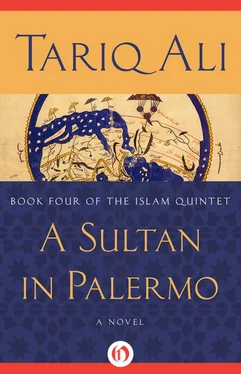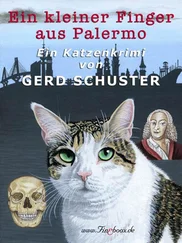Spring in Siracusa. Good and bad poetry. Fathers and sons.
THERE CAN BE FEW delights in the world as pleasant as a Siracusan spring. The fragrance of the lemon, orange, apricot, almond and peach blossoms pervade the city, enriched by the moist, salty sea breezes. On the hills outside the city the age-old, laboriously cultivated plantations of olive trees are being carefully inspected for the damage caused by the winter storms and lightning. The sun radiates a welcome warmth and the air is fresh, not mournful and lazy, as in summer.
And all this is greatly enhanced when a person is in love. Since his arrival from Palermo a month ago, Idrisi and Balkis had revelled in each other’s company. There was nothing furtive in their behaviour, but were it not for the fact that they went riding openly and were sometimes accompanied by the Amir himself, there would have been an incessant wagging of tongues. The palace eunuchs and a few loyal serving women were aware that Balkis often spent the night in Idrisi’s room and, while they talked to each other, they ensured the secret remained confined to the palace.
One glorious fresh morning, before the sun had dried the earth, she insisted they discard their sandals and walk to bathe their feet in dew, on the leaves and grass. It was one of his cures for persistent headaches and he asked if she was feeling well.
‘I read a bad poem by Ibn Harridis this morning while you were still asleep and it gave me a headache.’
He smiled. ‘Balkis, you are unfair to the poet. There are some unbearable poems, but he has also written some very fine verses. You must not punish him because Aziz belongs to the same family.’
‘You cannot imagine the praise they reserve for him. It’s as if no other poet had existed. Aziz is more restrained, but even he insisted on naming our son Hamdis. Why are you laughing?’
‘I shouldn’t encourage you, but I suddenly remember a quatrain written by Ibn Hamid, one of my childhood friends from Noto.’
‘You never mentioned him before.’
‘Too many painful memories. We quarrelled before he left. He accused me of being a creature of the Sultan. I miss him greatly now and…’
‘The quatrain?’
‘Let me try and remember. A minor poet from Noto, well-known frequenter of bars and brothels, is visiting Siracusa to sample his favourite male prostitute. He runs into Ibn Hamdis. The great poet is agitated and his clothes are ruffled. The visitor from Noto inquires politely as to the cause and a brief exchange between the two is abruptly brought to an end:
“I have been robbed! The thieves have ruined me!”
“I sympathise, I share your grief.”
“They stole a batch of my own poetry!”
“I sympathise — with the poor thief.”’
She laughed unrestrainedly.
‘My headache has gone. Your cure has worked.’
Idrisi had come prepared for a long stay, accompanied by Elinore, Ibn Thawdor, and three hundred books considered necessary for his still uncompleted work. Mayya had promised to come later when Afdal was slightly older. Idrisi’s day was carefully organised. He spent five hours in the palace library where he was surprised to find a few manuscripts by authors previously unknown to him. He was impatient with any book that contained superstitions and presented them as scientific knowledge. And there were many of these he had angrily thrust aside during the course of his work.
The rest of the day was spent in Balkis’s company. They could talk and laugh together for hours. She accepted his balanced critique of Ibn Hamdis and phrased her own remarks more carefully, but her basic view of the poet remained unaltered, although they agreed never to discuss the matter with the poet’s descendant.
Elinore had begged him to let her marry as soon as possible. He had observed the young couple on the boat journey and was convinced that they were destined for each other. He asked them both whether they were happy to be married in the absence of her mother and his parents and was told that both parties had recommended this course of action. The Amir took charge of the matter and on a beautiful Sunday morning, Elinore bint Muhammad and Ibn Thawdor were married by a Bishop at a quiet ceremony in the old Byzantine church. They were assigned a set of rooms in the palace and at the feast that evening, Ibn Thawdor played the flute to mark his own wedding.
Several weeks later a messenger arrived from Noto with a letter from Sakina, his oldest daughter, informing Idrisi that her mother had died peacefully a few days earlier. The rest of the family had gathered, with the exception of Walid, and she pleaded with Idrisi to return to the estate and decide what should be done. It was not a decision for her or anyone else.
‘I will have to go,’ he told Balkis. ‘I was quite content to die without seeing my house again, but Allah has willed otherwise. It is strange, but I feel nothing for the departed woman. Nothing.’
‘Take Elinore and Ibn Thawdor with you. You enjoy their company and she should see the house where her father was born. If I did not have to carry out the five obligatory breast-feedings for Hamdis, I would have accompanied you as well, just in case the dust on the journey gave you a sore throat.’
They left early one morning in a large covered cart drawn by two horses and with a retinue of four armed retainers. A new path had been opened to reduce the time it took to reach Noto. The reasons for this were military, but everyone benefited and the traders had been especially pleased. As they passed an ancient viaduct he insisted they break the journey. He had seen it from afar on previous visits and now he had an opportunity to observe its structure more closely.
‘I agree to stop,’ said Elinore, ‘provided we are spared a lecture on ancient Rome.’
Idrisi smiled and ignored the remark, but to punish her he took Ibn Thawdor with him and improved the boy’s understanding of the ancient world. As they resumed their journey a silence fell. They were all thinking of what lay ahead.
Idrisi had not seen his oldest son, Uthman, for almost twenty years and the thought of the boy pained him. As a physician, he could try and cure pain and stomach disorders and fevers and snake-bites, but he had no idea what caused mental suffering or why his oldest child had been born with a disordered mind. There was no blemish on his body. He had been as normal as any other child except that he was slow to speak. This had not worried him unduly till the boy was five and barely spoke. He did learn eventually, but it became obvious that he was different from the rest. He preferred to be alone. He would talk to the farm animals at length and could be seen laughing with them, but when a human approached he would rush and hide in a barn or behind a tree or crouch in the open and imagine that nobody could see him.
Not wishing Elinore to be taken by surprise, Idrisi told her the entire story. Her only response was to hold his hand tightly. She had been wondering how the family would receive her and Ibn Thawdor. Perhaps it had been a mistake to come with her father.
The sun was still up as they entered the estate on the outskirts of Noto. The large house stood at the top of the exposed hill. It was built on two levels around a courtyard bordered by a row of orange trees. Behind the house were peasant houses built on the slope and near them a tiny domed mosque.
Below the house, on either side of the path, were gently sloping terraces, first cultivated by his grandfather. Fruits of every variety were flanked by mulberry for the silkworms. Vegetables and wheat were grown in the flat fields nearby. The sight pleased him. Sakina’s mother must have been a good administrator — something he could not quite believe — but there was nobody else who could have watched over everything, once he had left and made it clear he had no intention of returning.
Читать дальше












